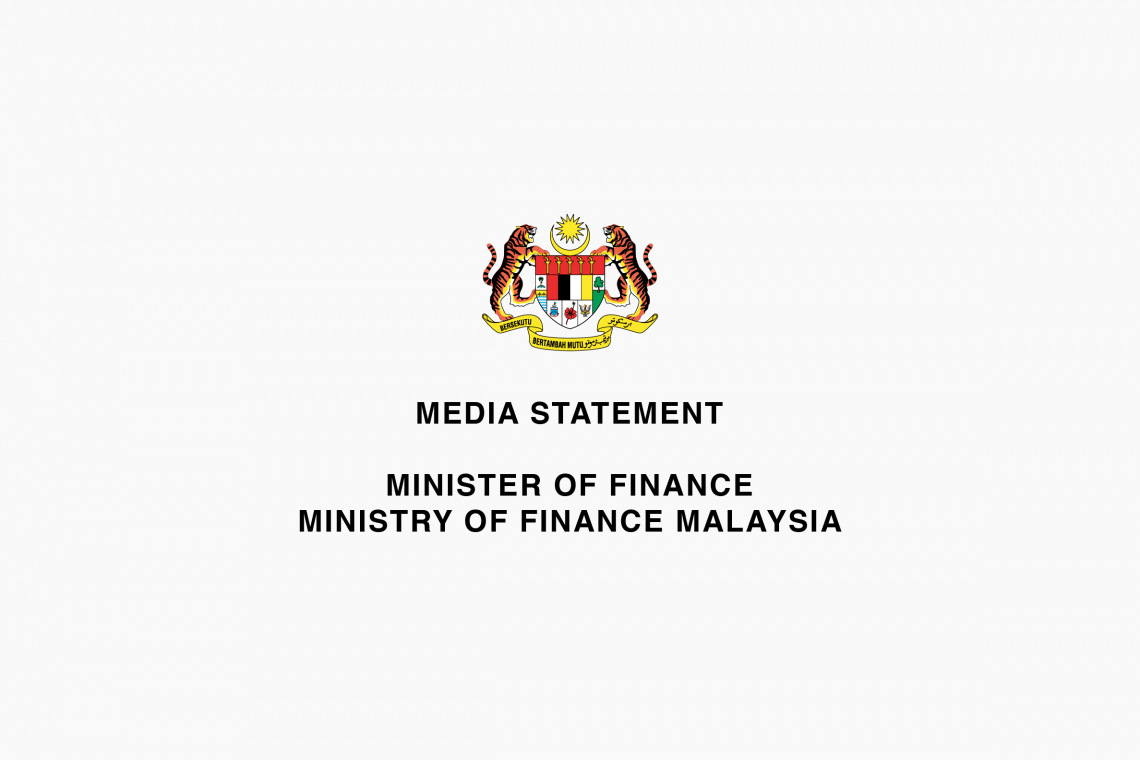WHAT ARE YOU LOOKING FOR?
Popular Tags
Press Release
Fitch Ratings’ Affirmation Reflects Confidence In Malaysia’s Policies and Prospects

Fitch Ratings has affirmed Malaysia’s Long-Term Foreign-Currency Issuer Default Rating at BBB+, with a Stable Outlook. Such affirmation comes amidst unprecedented credit rating pressures globally, where the three main Credit Rating Agencies (CRA) had issued 101 negative outlook positions as at end-2020.
Malaysia's rating affirmation is a testimony of the economy’s resilience in amidst an uncertain landscape, with good medium-term growth prospects and stable current account surplus supported by a diversified market and export offerings. Malaysia has consistently registered a current account surplus over the past two decades with its largest ever trade surplus of RM184.8 billion in 2020, equivalent to 4.2% of GDP. This is further supported by adequate international reserves, significant external assets held by banks and corporates, as well as net foreign currency external asset position of RM1.1 trillion or 77.0% of GDP as at end-March 2021. These factors, supported by a flexible exchange rate policy, underpin Malaysia’s ability to withstand external shocks. Moreover, Malaysia’s retention in the FTSE Russell’s World Government Bond Index (WGBI) is testimonial to the country’s well-developed capital market, as well as its strong macroeconomic fundamentals and resilience.
National Recovery Plan for a Safe and Systematic Exit from COVID-19
In addressing the COVID-19 pandemic, Malaysia has announced the National Recovery Plan (NRP) – a dynamic, flexible and forward-looking strategy guided by data and science. Premised on a whole-of-nation approach, the Government will seek cooperation from industry experts, NGOs, community leaders and the general public in implementing the NRP. The NRP’s systematic approach is expected to strike a good balance between protecting lives, and safeguarding livelihoods. Notably, since the NRP’s implementation on 1 June 2021, eight out of 14 states in Malaysia have recorded a significant decline in new cases, allowing them to shift to phase two over the past week, where more economic sectors and social activities are allowed under strict compliance to SOPs.
In terms of protecting the rakyat and businesses, since the onset of the pandemic, continuous support has been extended through the Government’s eight stimulus and assistance packages valued at RM530 billion as well as an annual Budget worth RM322.5 billion for 2021. Out of Budget 2021 and those packages, RM300 billion is still available to support economic recovery, particularly throughout the NRP. Thus far, close monitoring by the Ministry of Finance’s National Inter-Agency Economic Stimulus Coordination and Implementation Agency (LAKSANA) reveals that the stimulus and assistance packages have saved 2.8 million jobs, as well as benefitted more than 20 million people and 2.4 million businesses since March 2020.
Vaccination Success is Key to Economic Recovery
The National COVID-19 Immunisation Programme (PICK) continues to be ramped up to hasten economic recovery. Malaysia is currently one of the fastest nations in the world to administer vaccinations, with more than 400,000 doses daily. PICK is expected to boost the vaccination rate to 500,000 doses daily, while also aiming for 100% of the adult population in Selangor and Kuala Lumpur to be given at least one dose of the vaccine by 1 August under the Operation Surge Capacity. Based on this fast-track approach, 100% of the adult population are expected to be fully inoculated by end-October 2021.
Other factors that will drive Malaysia’s economic recovery include improving external demand from major trading partners, and the implementation of infrastructure projects with high multiplier impact. Other supporting factors include Malaysia’s economic fundamentals, as well as its depth and breadth, enabling it to remain resilient even during difficult times. Notably, Fitch has acknowledged that Malaysia’s manufacturing sector and exports will continue to benefit from thriving global demand for the country’s products like electrical and electronics (E&E), crude oil and personal protective equipment.
The Way Forward: Economic Priorities and Fiscal Reforms
Moving forward, digitalisation and technological adoption will be a national priority for boosting Malaysia’s longer-term economic prospects and resilience. This will be pursued in tandem with the Government’s commitment to medium-term structural reforms to attract higher quality investments, as well as generate high-skilled and high-paying jobs.
The Government remains committed to ensuring fiscal sustainability and medium-term fiscal consolidation. Over the past decade, the fiscal deficit had been successfully reduced from 6.7% (2009) to 3.4% (2019) of GDP. Guided by the Medium-Term Fiscal
Framework and supported by the gradual implementation of the Medium-Term Revenue Strategy which aims to improve the country’s revenue base, the Government will resume its consolidation path when the country exits the pandemic. This will balance short-term fiscal requirements with long-term fiscal and economic sustainability.
Overall, the Government's current priority is to protect lives from the threat of COVID-19 and ensure the country’s economic growth prospects remain strong in the medium to longer term, guided by the NRP and the principles of prudent financial management. The Government will continue to respond strategically, proactively and decisively under this challenging COVID-19 environment, while also minimising permanent economic scarring from the pandemic crisis.
YB Tengku Dato’ Sri Utama Zafrul Tengku Abdul Aziz
Minister of Finance
19 July 2021
Appendix

